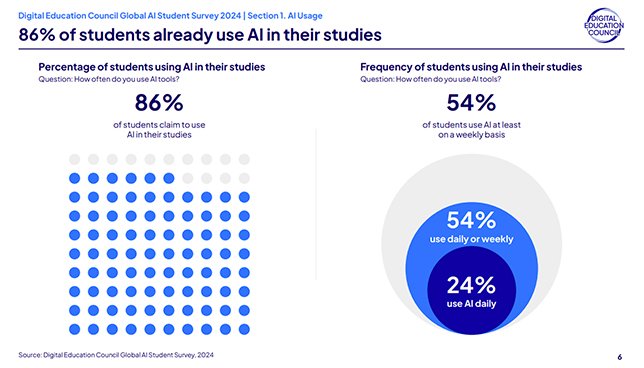In a recent survey from the Digital Education Council, a global alliance of universities and industry representatives focused on education innovation, the majority of students (86%) said they use artificial intelligence in their studies. And they are using it regularly: Twenty-four percent reported using AI daily; 54% daily or weekly; and 54% on at least a weekly basis.
Courtesy of Digital Education Council
For its 2024 Global AI Student Survey, the Digital Education Council gathered 3,839 responses from bachelor, masters, and doctorate students across 16 countries. The students represented multiple fields of study.
On average, surveyed students use 2.1 AI tools for their courses. ChatGPT remains the most common tool used, cited by 66% of respondents, followed by Grammarly and Microsoft Copilot (each 25%). The most common use cases:
Despite their wide use of AI tools, students were not confident about their AI literacy, the survey found. Fifty-eight percent of students reporting feeling that they do not have sufficient AI knowledge and skills, and 48% felt inadequately prepared for an AI-enabled workforce. Notably, 80% of surveyed students said their university’s integration of AI tools (whether that be integration into teaching and learning, student and faculty training, course topics, or other areas) does not fully meet their expectations.
Students’ top AI expectations included:
“The rise in AI usage forces institutions to see AI as core infrastructure rather than a tool,” commented Alessandro Di Lullo, CEO of the Digital Education Council and Academic Fellow in AI Governance at The University of Hong Kong. At the same time, he said, “universities need to consider how to effectively boost AI literacy to equip both students and academics with the skills to succeed in an AI-driven world.”
The full report is available here on the Digital Education Council site.
About the Author
Rhea Kelly is editor in chief for Campus Technology, THE Journal, and Spaces4Learning. She can be reached at [email protected].
E-Mail this page
Printable Format
Google recently unleashed a slough of generative AI technologies, from the next generation of its open foundation model to an open source AI agent platform.
OpenAI has introduced SearchGPT, a new AI-powered search engine designed to access information from across the internet in real time. The much-anticipated prototype will provide more organized and meaningful search results by summarizing and contextualizing information rather than returning lists of links.
It pays to be conversant in cloud, according to a new study from Skillsoft The company’s annual IT skills and salary survey report found that the top three certifications resulting in the highest payoffs salarywise are for skills in the cloud, specifically related to Amazon Web Services (AWS), Google Cloud, and Nutanix.
Ed tech company Cengage has announced the beta launch of Student Assistant, a generative AI tool designed to guide students through the learning process with personalized resources and feedback.
More Portals
More Webcasts
More White Papers
